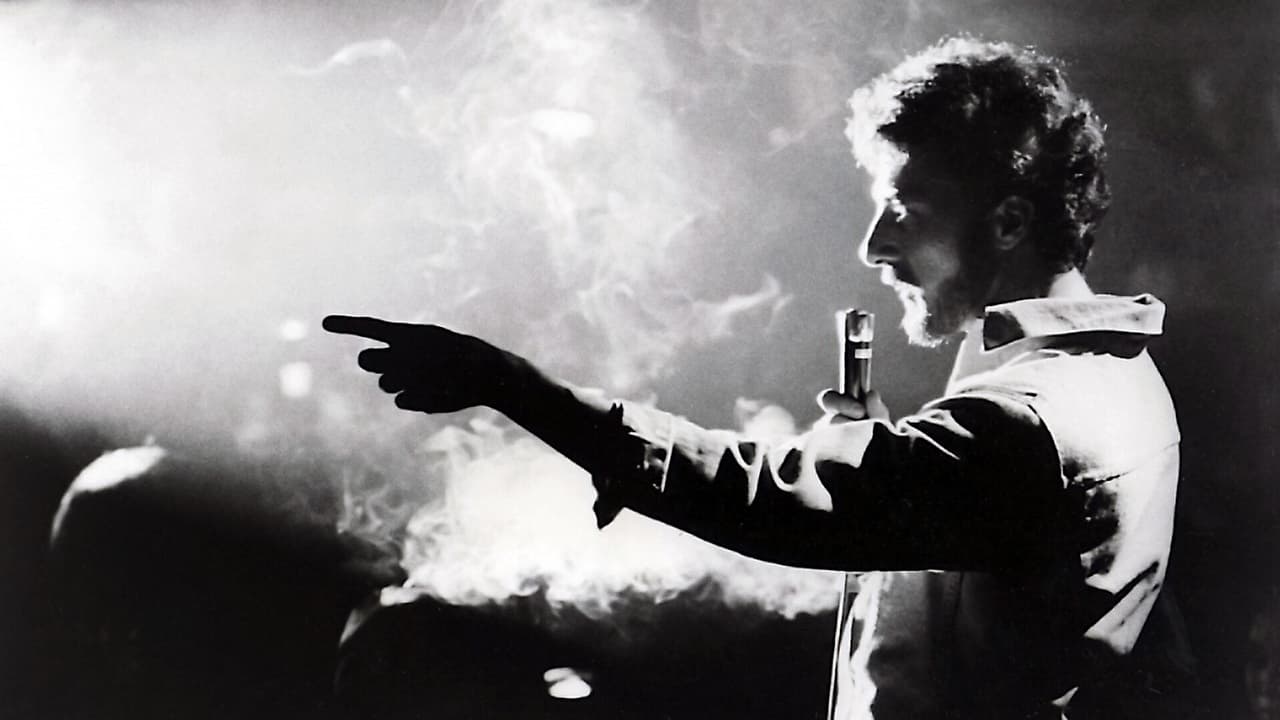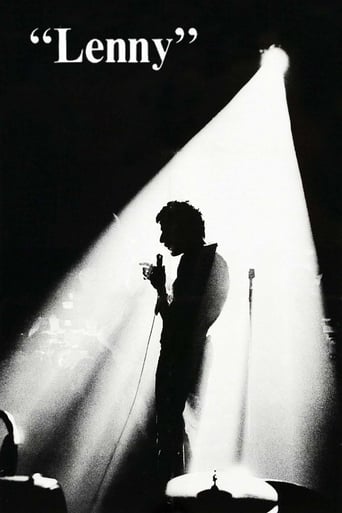

"Lenny" is a movie better appreciated than enjoyed, much in the same class as "The Unforgiven," "Taxi Driver," and "Bad Lieutenant." Dustin Hoffman, as one might expect, literally crawls into Lenny Bruce's skin in portraying the groundbreaking but fatally flawed comedian/social critic's short, tumultuous life. What is an unexpected surprise is Valerie Perrine's stunning performance as Bruce's unstable wife, Honey Harlow. Those who are more familiar with Perrine's performances as glorified eye candy will be blindsided by her acting chops as demonstrated here.The use of black-and-white film captures the bleak mood of the film, which strains under the pressure of persuading viewers to follow two unlikable characters for two hours. While Bruce may have been brave and visionary in breaking down taboos at the time, this film correctly avoids making him a completely sympathetic figure.Despite the great acting performances, the film's quasi-documentary approach leads to a disjointed narrative that is more distracting than effective. "Interviews" with the actual relatives and colleagues of Bruce rather than actors portraying them - still possible when the film was made in 1974 - would have been more convincing in laying out Bruce's intentions and persona.Bottom line is that this film is worth watching, though one will leave depressed. Bob Fosse's approach to portraying Bruce's career will be appreciated by some more than others, but if he was attempting to make the audience bemoan Bruce's John Belushi-style exit from life, he failed with this viewer.
... View MoreThe first time i've heard about Lenny Bruce, it was from my hero George Carlin and i must say right off the bat that i haven't heard or saw much material from Lenny before this film, (yeah i know, shame on me) but at least i didn't had any expectations whatsoever.Factual or not? Once again i couldn't care less, it was a great entertainment. If i want facts about an artist i'll read a biography or watch a documentary, i will certainly not document myself on somebody through Hollywood for obvious reasons, if you can't figure them out, get off my review right now...Great performances, great story, amazing cinematography and editing, i really loved that movie. The "interview style" approach was brilliant and the jazzy/black & white atmosphere was delightful. That one shot scene near the end is astonishing and very sad, that scene alone worth the movie.Censorship, obscenities, anti-conformism, power of words, drug abuse and freedom of speech could resume quite well this movie in my opinion; and it makes me realize that i can't _______ write whatever i _______ want (at least not here) even in 20 _______ 13 can you _______ believe that?!In one word: Entertaining....And ____ censorship!
... View MoreCinema always used to be a bit behind other media in terms of freedom from "moral" censorship. This stems from archaic and elitist notions that, as it presents its ideas visually and reaches a wider and supposedly less cultured audience that cinema is a more corrupting medium than books or theatre. So while the great comic Lenny Bruce was tussling with obscenity laws in the 50s and early 60s, it wasn't until the era following his death that his story would be deemed safe for the screen.Luckily this was also a good era for honest, balanced and very human portrayals of controversial figures. This version of his life, adapted by Julian Barry from his own play, flits between different views on Bruce. There are two framing narratives, the first a series of staged interviews giving the perspectives of those who knew and loved him, the second clips of a bearded Bruce doing his stand-up in the later years of his life. Between these we see fleeting episodes from the comic's life, told in an implicit style with scant dialogue. The interviews elucidate and expand these events, but even more cleverly the stand-up excerpts comment upon them. The stand-up is the substitute for an interview with Bruce, and the implication is that it was only during his shows that he was really able to be express himself fully.This was the first non-musical feature of choreographer-turned-director Bob Fosse. He doesn't adapt his style too much, with the same punchy, rhythmic and very precise approach he used in his musicals. Fosse's shots are typically very simple, the Bruce Surtees cinematography often shrouding all but the faces in darkness, or keeping at least keeping the backgrounds fairly plain or out-of-focus. Camera movement is minimal. The storytelling is all in the edit for Fosse. A great example of this is in Valerie Perrine's stripping scene near the beginning. Fosse gives her camera coverage much as he might have given Liza Minnelli in Cabaret, but he's also throwing in shots of the audience and the band, getting reactions and revealing the variety of punters that the show is getting. He takes the complete opposite approach towards the end with the scene of a drugged-up Lenny stumbling through his act, with a long-take from a high angle making the comic a pathetic little figure among the stage paraphernalia. After the close camera and choppy edits of the rest of the movie, the change is all the more stark.Dustin Hoffman, then still a relatively young actor, takes on the difficult task of playing a real figure only recently deceased. I've seen recordings of the real Lenny Bruce. Hoffman doesn't try to copy him slavishly, but he captures a way Bruce could have been, and is I feel completely true to the spirit of the man. He also brilliantly handles the transition from young to old Lenny. It's not just the beard that distinguishes those flash-forwards of later Bruce shows; Hoffman has more presence and confidence about him. Perrine is really good too, naturally bringing her previous work experience into the stripping scene, but then showing a delicate realism in the more dramatic moments.For an audience today, the taboos Bruce breaks seem fairly tame. The stuff he gets busted for now can be, and regularly is, said on national TV. But the movie shows us not a shocking tale of boundaries smashed, but an intimate portrait of the man who smashes them. We see Bruce as the complex human we can recognise and the witty fighter we can root for. And it is this touching humanity which gives Lenny a compelling quality outside of its time.
... View MoreThis is a movie of a stand-up comedian, Lenny Bruce.Lenny was a Jewish comic, who found love from a "Shiksa goddess", a stripper named Honey.Lenny's act consisted of some questionable material, something not approved by conservative citizens.He found himself often in the courtroom.And then he found drugs with Honey.Along came marital problems and an early death.Lenny (1974) is a Bob Fosse film.The screenplay is by Julian Barry, and it's based on his play by the same name.Dustin Hoffman portrays brilliantly the main character.He probably does a better job than Lenny ever did.Valerie Perrine is amazing as Honey Bruce.Jan Miner is very good as the mother Sally Marr.Stanley Beck is great as Artie Silver.Gary Morton does terrific job as Sherman Hart.I saw Lenny a week ago in a movie theater, for free.I liked the experience.This movie is pretty dramatic, being a movie of a comedian.One of the most memorable moments is when Lenny does an act on dope, wearing a raincoat.That scene shows in a brilliant way the fall of a comedian.And it actually happened.Before seeing this movie I knew very little of this guy.So it's a great introduction to the phenomenon called Lenny Bruce.
... View More